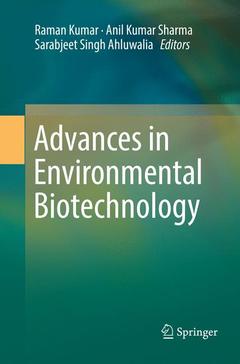Description
Advances in Environmental Biotechnology, Softcover reprint of the original 1st ed. 2017
Coordinators: Kumar Raman, Sharma Anil Kumar, Ahluwalia Sarabjeet Singh
Language: English
Subjects for Advances in Environmental Biotechnology:
Keywords
Bioremediation; Environment; Heavy metals; Microbial; Pesticides
Publication date: 12-2018
Support: Print on demand
Publication date: 04-2017
Support: Print on demand
Description
/li>Contents
/li>Biography
/li>Comment
/li>
The book aims to provide a comprehensive view of advanced environmental approaches for wastewater treatment, heavy metal removal, pesticide degradation, dye removal, waste management, microbial transformation of environmental contaminants etc.
With advancements in the area of Environmental Biotechnology, researchers are looking for the new opportunities to improve quality standards and environment. Recent technologies have given impetus to the possibility of using renewable raw materials as a potential source of energy. Cost intensive and eco-friendly technology for producing high quality products and efficient ways to recycle waste to minimize environmental pollution is the need of hour. The use of bioremediation technologies through microbial communities is another viable option to remediate environmental pollutants, such as heavy metals, pesticides and dyes etc.
Since physico-chemical technologies employed in the past have many potential drawbacks including higher cost, and lower sustainability. So there is need of efficient biotechnological alternatives to overcome increasing environmental pollution. Hence, there is a need for environmental friendly technologies that can reduce the pollutants causing adverse hazards on humans and surrounding environment.
Dr. Raman Kumar is working as Associate Professor in Department of Biotechnology, Maharishi Markendeshwar University, Mullana (Ambala), Haryana, India Since 2011. He has also worked as Senior Research Fellow, Division of Soil and Crop Management, Central Soil Salinity Research Institute, Karnal, India from 2007 to 2010. He has experience of about 10 years in the field of Teaching and Research in the area of Microbial and Environmental Biotechnology. He has published more than 30 publications in Various National and International Peer Reviewed Journals. He developed many bacterial and fungal strains for removal of heavy metals from wastewater. His current research areas are Bioremediation and Biodegradation of toxic pollutants, Pesticides and azo dyes using microbial consortium from the industrial Effluents, Mechanism involved in the heavy metal bioremediation.
Dr. Anil K. Sharma is a full Professor and Head of the Department of Biotechnology with about 15 years of Teaching and Research experience after PhD. He did his doctorate from PGIMER Chandigarh (Year 2000) in the field of Medical Biotechnology. He worked as a Senior Research Scientist and a Post Doctoral Research Fellow (Molecular biology) in the Microbiology and Immunology Department at UIC College of Medicine Chicago, IL,USA for about 7.5 years. He has more than 80 publications in peer-reviewed journals of national and international repute with a cumulative impact factor of his publications around 115. He has won many prestigious awards and accolades in his career. In 2000, He was felicitated with a MGIMS Young Scientist Award from Association of Clinical Biochemists of India (ACBI) while in 2013 he won the Bharat Excellence Award from FFI, New Delhi, India for his research accomplishments in basic sciences. His research interests are diverse ranging from understanding the metal regulation in prokaryotes and eukaryotes, drug resistance, cancer biology, nanomedicines to the




